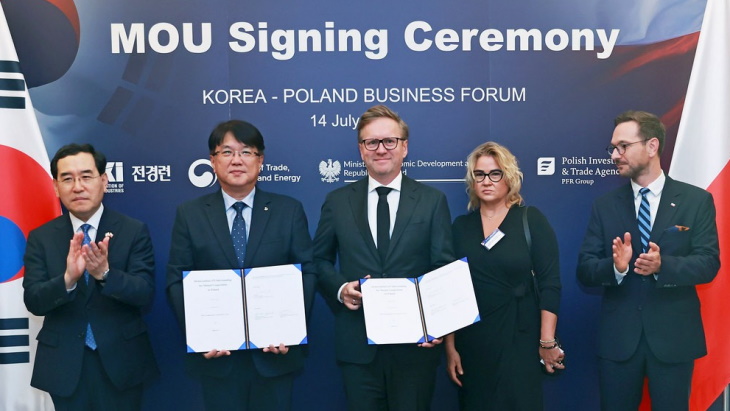
Under the MoU, copper and silver producer KGHM and Samsung C&T envisage the creation of a dedicated working group consisting of representatives of both companies to exchange information and conduct analytical work in selected project areas.
"We assume that half of the energy consumed by KGHM will come from our own production, including renewable energy sources," said KGHM President Tomasz Zdzikot. "Our Gas-Steam Blocks already secure nearly 20% of this demand, we are also developing RES (renewable energy sources) projects, planning the construction of SMRs and exploring the possibilities of reaching for other technologies, including hydrogen. We hope that the experience and financial potential brought by Samsung will strengthen our efforts on the way to implementing technologies related to the energy transformation and zero emissions."
KGHM noted that one of the "important projects that will bring the company closer to achieving energy independence" is the deployment of SMR technology. In February 2022, KGHM signed a definitive agreement with NuScale Power of the USA to initiate work towards deploying a first NuScale VOYGR SMR power plant in Poland as early as 2029. It said NuScale's reactor design is based on the well-known concept of pressurised light water reactors, while its modular, integrated design allows for the simplification and shortening of the investment and construction process.
Samsung C&T - which worked on the construction of the Barakah nuclear power plant in the UAE - is a minority shareholder in NuScale Power.
Last week, Poland's Ministry of Climate and Environment issued a decision-in-principle to KGHM on the construction of a power plant based on NuScale Power's SMR technology. The decision-in-principle is a general opinion on selected conditions enabling the construction of a NuScale VOYGR modular nuclear power plant with a capacity of 462 MWe consisting of six modules, each with a capacity of 77 MWe. The decision represents official state approval for the planned investment in accordance with the assumptions and concept presented by the company.
Meanwhile, Daewoo E&C signed an MoU with the Polish Construction Association and ERBUD, the country's third-largest construction firm, to "establish a cooperative relationship".
"Through this business agreement, Daewoo E&C has established a network with local construction companies in Poland, and through cooperation with these companies, it will be possible to promote projects in various business fields, such as energy and infrastructure, in addition to the ongoing nuclear power plant project," it said.
Daewoo E&C said it was already preparing for the Polish commercial nuclear power plant market with Team Korea along with Korea Hydro & Nuclear Power (KHNP).
In October last year, Poland's Ministry of State Assets, South Korea's Ministry of Trade, Industry and Energy, Polish companies ZE PAK and PGE, and KHNP signed a letter of intent to develop plans for Poland's second nuclear power plant, in Pątnów. The plant will comprise of at least two Korean-supplied APR1400 reactors with a total capacity of 2800 MWe.
"We can expect to secure opportunities to participate in a number of projects, such as public infrastructure projects and new growth projects in the Polish construction market, which has entered an expansion phase, and thanks to the government's active support, we will showcase Korea's construction technology and contribute to enhancing national prestige."